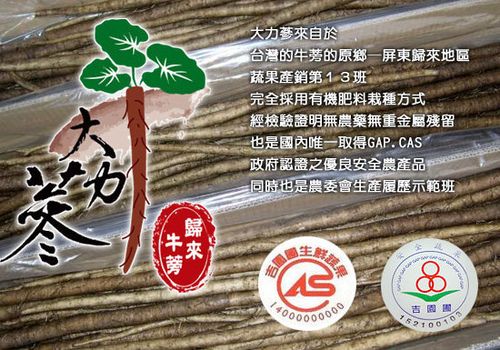外交部Taiwan Today 「今日台灣」電子日~~歸來大力蔘牛蒡

Carl Chen showcases the burdock he grows in Guilai Community, Pingtung City. (Photos courtesy of Carl Chen)
•Publication Date:05/19/2013
•Source: Taiwan Today
•By Grace Kuo
In the 1980s and 90s, up to 100 hectares were devoted to the cultivation of burdock in Guilai Community, part of southern Taiwan’s Pingtung City, with much of the harvest exported to Japan. Following population outflow related to structural changes in the economy, however, land planted in burdock fell below 20 hectares.
In 2009, Guilai local Carl Chen, an epidemiologist who had been working as manager of a Taipei-based food biotech firm, decided to go home and turn the decline around.
“Coming back to work as a farmer had always been a part of my career plan,” the 42-year-old third generation burdock grower said. “My childhood memories are centered on the farm, where I’d play in the fields and help out with the work. It pained me to watch so many people move away.”
Although a managerial position in Taipei might have seemed enviable to many farmers, Chen said that to him it was a kind of constraint.
“I returned out of feelings for my hometown, as well as the sense that I had a mission I needed to accomplish.”
Burdock farming in Guilai can be traced back to the Japanese colonial period (1895-1945). “The root crop is very popular in Japan due to its high nutritional value,” Chen said. “Burdock wasn’t grown anywhere in Taiwan when the Japanese came, so they conducted a survey to find out where it might be profitably grown.
“That’s when they discovered Guilai was the most suitable place,” he said. “Its soil is formed of alluvial river deposits with parental material of weathered slate from Pingtung’s Dawu Mountain. This type of earth is soft, well-drained and full of minerals such as iron-manganese concretions, which are perfect for cultivating burdock.”
Thanks to these natural conditions, Guilai burdock has a slight ginseng scent, giving it an edge over that grown in the rival Jiangjun District of Tainan City, for instance.
In addition, the crop is high in chlorogenic acid, the dietary fiber inulin and total polyphenol, Chen said. “Chlorogenic acid and total polyphenol facilitate cell regeneration and help remove free radicals in the body, while inulins, similar to oligosaccharides, enhance probiotic activities and strengthen the digestive system.”
The plant root also contains protein, unsaturated fatty acids and vitamins A, B, C, E and P.
In earlier days burdock was a little-known exotic species in Taiwan, Chen said. People did not know how to cook it and farmers knew little about marketing it.
In 2003, Chen became the leader of a production and marketing group dedicated to remedying this situation, although he was still working in Taipei at the time. Composed of 13 Guilai locals with five experts in biotechnology, comestibles, health and medicine, the organization drew up a five-year plan for rejuvenation of the burdock industry. The aim was to connect marketing and production, thus achieving an economy of scale.
“Through the group, we hope to beef up production while cutting costs, and thus revive burdock farming.”
The organization bases its operations on culture, safety and technology. “We promote the standardization of production procedures, which requires farmers to implement environmentally friendly methods, obtain Good Agriculture Practice certification and provide produce traceability.”
Traditional methods of cultivating and harvesting burdock by hand have also been preserved, Chen said. “Of course, we use machinery in the production process to meet export orders, as the old techniques are more costly and time-consuming, but we also host activities in which young people can experience traditional farming activities such as digging up burdock root with a shovel.”
Many youngsters nowadays do not realize that burdock is a root crop, he added.
The group established Dalisen Natural Foods Co. Ltd. in 2008 to further improve marketing of the crop. “Dalisen” was chosen for the band name since it is the oldest known Chinese name for burdock and the plant got its start in Taiwan at Guilai.
Burdock tea is one of Dalisen’s popular spinoff products.
The firm has applied the latest technologies to develop burdock tea and serum, with more products on the way. Burdock bread, made in cooperation with area bakeries, has further expanded applications of the crop. After 10 years of promotion, Dalisen products can now be found in Matsusei supermarkets nationwide, while exports to Japan have increased, Chen noted.
One of the greatest challenges the group has come up against is farmers’ hesitancy to accept new ways of doing things. “One the one hand, they have long-practiced skills with which they’re very familiar, but on the other, there’s a whole new knowledge economy, so we had to find ways to persuade them to change.”
Strategic alliances with other sectors such as tourism and food products figure prominently in Chen’s plans for ongoing promotion of Guilai’s burdock. He hopes diversified development of the sector will draw more former residents back to the community—whose name means “return.” (THN)
Write to Grace Kuo at mlkuo@mofa.gov.tw
資料來源:http://taiwantoday.tw/ct.asp?xItem=205288&CtNode=436